Top 10 Video Calling apps for business
March 05, 2025 | Editor: Adam Levine
30
Video Calling apps and services that allow to easily start a face-to-face secure video meeting.
1
WhatsApp Messenger is a cross-platform mobile messaging app which allows you to exchange messages without having to pay for SMS. WhatsApp Messenger is available for iPhone, BlackBerry, Android, Windows Phone and Nokia and yes, those phones can all message each other! Because WhatsApp Messenger uses the same internet data plan that you use for email and web browsing, there is no cost to message and stay in touch with your friends.
2
Discord is a VoIP and instant messaging social platform. Users have the ability to communicate with voice calls, video calls, text messaging, media and files in private chats or as part of communities called "servers".
3
(Formerly Google Hangouts) Video meetings for your business. Connect with your team from anywhere. With easy-to-join video calls, you can meet face to face without the added cost of travel.
4
Telegram is a messaging app with a focus on speed and security. It’s super-fast, simple, secure and free. Telegram seamlessly syncs across all of your devices and can be used on desktops, tablets and phones alike. You can send an unlimited amount of messages, photos, videos and files of any type (.doc, .zip, .pdf, etc.). Telegram groups have up to 200 people and you can send broadcasts to up to 100 contacts at a time. Be sure to check our website for a list of Telegram apps for all platforms.
5
Privacy is possible, Signal makes it easy. Send high-quality group, text, picture, and video messages, all without SMS and MMS fees.
6
Facebook Messenger is an instant messaging service and software application which provides text and voice communication. Available now for Android and iPhone.
7
Viber is a mobile app that provides free international calls and text messages to other Viber users using 3G or Wi-Fi. Uses your existing contact list - check out which of your phone contacts and friends is already on Viber so that you can call and text them for free.
9
FaceTime is a video calling software application and related protocol developed by Apple for supported mobile devices running the iOS, in addition to Macintosh computers running Mac OS X 10.6.6 and higher. FaceTime is supported on any iOS device with a forward-facing camera.
10
WeChat is a free messaging & video calling app that allows you to easily connect with family & friends across countries. It's the all-in-one communications app for free
11
Zangi provides a messenger platform on top of which you can build your business solution. The variety of features are added to Zangi platform to build any type of communication and collaboration solution. High-quality features are provided to build secure, private and independent messaging apps in a short period of time.
12
Snapchat is a photo messaging application. Using the application, users can take photos, record videos, add text and drawings, and send them to a controlled list of recipients.
Important news about Video Calling apps for business
2025. Microsoft discontinues Skype
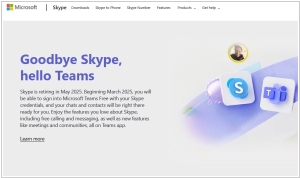
Skype's official X-Twitter account announced that the messenger will shut down in May 2025, encouraging users to switch to Microsoft Teams. Skype was launched in 2003. Microsoft acquired Skype in 2011 for $8.5 billion and since then, the company has been gradually abandoning its own communications products, such as Windows Live Messenger. In 2015 Skype was integrate into Windows 10, but the integration was unsuccessful. In 2017, Microsoft introduced Teams - an enterprise communications platform based on Skype technology, to compete with services like Slack. Since then the company has been pushing Teams hard, which became evident with the release of Windows 11, where Teams, not Skype, received deep integration into the operation system.
2024. X is launching audio and video calls
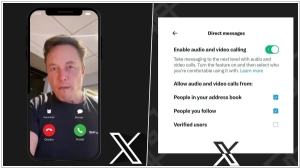
X (formerly known as Twitter before it decided a rebrand was in order) has rolled out audio and video calls for its regular users, no longer reserving this dubious privilege for its premium subscribers. To partake in this feature, one must wade through a direct message, tap a phone icon that one might have thought was decorative and then choose whether to subject themselves to an audio or visual encounter. Of course, this all assumes you didn’t stumble upon the feature entirely by accident while scrolling through a sea of messages, wondering if you’d ever actually use it. The whole ordeal begs the question: in a world already teeming with communication platforms, does anyone really need X to throw its hat into the ring? Sure, you don’t have to trade phone numbers—hardly groundbreaking when so many apps already do that—but the "unique value proposition" of this latest addition seems about as clear as mud. For the average non-paying user, it’s less of a handy feature and more of an afterthought glued onto the platform for reasons only the algorithm gods might understand.
2022. Google Duo to unite with Google Meet

Google Duo, the company’s video chat service for consumers, will soon merge with Google Meet, the company’s video chat service for business users. The Duo app will soon acquire all of Meet’s features, including scheduled calls and then, once the transition is complete, change its name to Google Meet. At that stage, the current Meet app will simply open the new Duo/Meet app. It’s a bit convoluted, but to be fair, migrating millions of users to the new platform was always going to be a substantial undertaking.
2021. Signal expands encrypted group video calls to 40 people
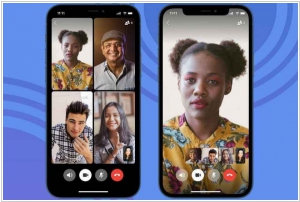
In a rather marvelous turn of events, the popular Signal messaging app has decided that five people on a video call was simply far too few, and has thus magnanimously raised the participant limit to a positively bustling 40. Yes, you read that correctly—enough people to host a small conference, start a minor revolution, or conduct an intergalactic council meeting (provided everyone has strong Wi-Fi). Despite this, Signal's famed end-to-end encryption will remain as solidly impenetrable as the Vogon poetry appreciation society—meaning that only those within the video call can see each other’s faces or hear their witty remarks. This encryption fortress keeps everyone else firmly out, be they government officials, hackers, or any curious soul who isn’t in on the chat. Unless, of course, they somehow gain access to your device—which, frankly, is entirely your own problem.
2021. Telegram added group video chat and screen-sharing
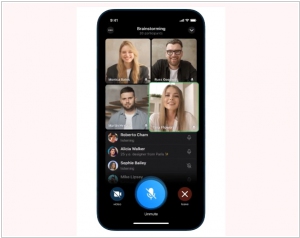
In the vast and improbably interconnected universe of Telegram, a splendid new trick has materialized, allowing up to 30 souls to bicker, banter, or otherwise communicate via video. Nestled snugly within the Voice Chat feature, a dazzling little camera icon now beams into existence whenever you summon a voice chat room. A mere tap on this technological marvel unleashes your video feed to the cosmos. Much like those intergalactic rivals—Zoom and Google Meet—you can go fullscreen, pin your favorite humanoid to the center of attention, and even keep them there when others dare to intrude. And because no journey is complete without a little show-and-tell, Telegram now lets you share your screen, seamlessly flipping between your glorious visage and whatever baffling content you wish to broadcast—or, if you're feeling particularly adventurous, both at the same time. Magic!
2020. Wonder raises $11M for a new approach to group video chat

Wonder, a Berlin-based startup that has developed a platform for individuals to gather in video-based groups to connect, network and collaborate, while also offering a panoramic view of a larger space where they can more spontaneously or purposefully engage with others—similar to an office or other professional venue—has announced today that it has secured $11 million in a significant seed round. Wonder now boasts 200,000 monthly users from a diverse range of organizations, including NASA, Deloitte, Harvard and SAP, which use it for various purposes, from team collaboration to career fairs.
2020. Remotion raises $13M to create a workplace video platform for short, spontaneous conversations
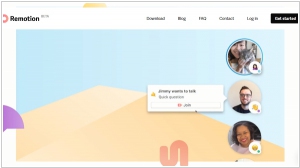
Hover over a team member’s profile pic bubble, click the video chat icon, send a quick chat request and start a video conversation. It’s far from a groundbreaking workflow, but Remotion is striving to create a platform that makes video calls feel like less of an occasion and more like a simple way to quickly resolve issues without the need for back-and-forth emails or Slack messages. Remotion is launching its product in beta today and announcing that they’ve secured $13 million in funding. The startup is introducing its product in the wake of a historic pandemic that many believe could fundamentally alter companies' attitudes from strict office environments to embracing more hybrid and fully remote workforces.
2020. Facebook updates Messenger Rooms to take on Zoom
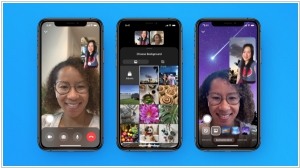
Messenger Rooms, Facebook’s Zoom rival, is introducing new features designed to make Rooms easier to both establish and discover, as well as to further tailor your Rooms experience. The updated version of Messenger Rooms will now showcase the Rooms you’ve been invited to at the top of your Chats tab in your inbox to enhance their visibility. It will also make the option to create a new Room more prominent by placing it front and center in the Chats tab. Additional changes affect Rooms management. You can now set up a Room with a default, suggested, or custom activity, schedule a future start date and personalize your audience selection. Furthermore, the Manage Rooms feature will allow you to view, join, edit, or later remove the rooms you’ve created, or invite additional people to join an existing Room.
2020. Google brings Meet to Gmail on mobile
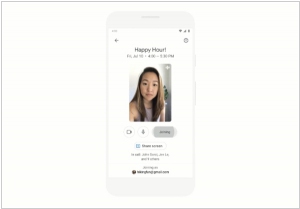
Google, in a fit of boundless enthusiasm for world integration, has decided that Meet, its beloved (or at least quite popular) video conferencing service, should now live cozily within mobile Gmail. As a result, if you happen to be using Gmail on Android or iOS, and someone sends you one of those ever-so-modern Meet links, you'll be magically whisked to the meeting from within your inbox, bypassing the pesky business of installing a whole separate app. The Gmail app, now donning an exciting new “Meet” tab at the bottom of the screen, will gallantly display all your upcoming Meet gatherings from Google Calendar, along with handy options to start a meeting, fetch a shareable link, or schedule one in Calendar. But, fear not, if you’re the sort of person who finds the concept of too many tabs a bit exhausting, you can politely ask this one to disappear with a quick toggle.
2020. Viber launches group video calls for 20 users
Viber becomes the latest platform for launch a Group Video Calls feature, enabling large meetings and online classes. The new feature will enable group video calls of up to 20 people with unlimited duration. Viber already has a lot of success with Group Audio Calls (up to 20 people) and group chats (up to 250 people) so in light of the current situation, Viber has also started to add video to its capabilities. Group Video Calls show the speaker to all participants but users can also choose to pin any video to their screen during the call – their own or other participant’s video. Users can also mute themselves, or disable video during the call, as well as see if other participants are on mute or their video is turned off.
















